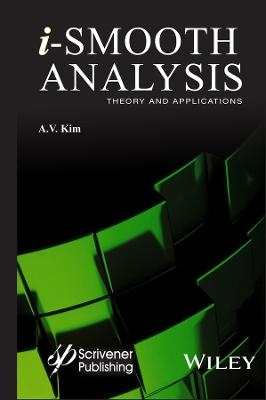
i-Smooth Analysis
Wiley-Scrivener (Verlag)
978-1-118-99836-6 (ISBN)
i-smooth analysis is the branch of functional analysis that considers the theory and applications of the invariant derivatives of functions and functionals. The important direction of i-smooth analysis is the investigation of the relation of invariant derivatives with the Sobolev generalized derivative and the generalized derivative of distribution theory.
Until now, i-smooth analysis has been developed mainly to apply to the theory of functional differential equations, and the goal of this book is to present i-smooth analysis as a branch of functional analysis. The notion of the invariant derivative (i-derivative) of nonlinear functionals has been introduced in mathematics, and this in turn developed the corresponding i-smooth calculus of functionals and showed that for linear continuous functionals the invariant derivative coincides with the generalized derivative of the distribution theory. This book intends to introduce this theory to the general mathematics, engineering, and physicist communities.
i-Smooth Analysis: Theory and Applications
Introduces a new class of derivatives of functions and functionals, a revolutionary new approach
Establishes a relationship with the generalized Sobolev derivative and the generalized derivative of the distribution theory
Presents the complete theory of i-smooth analysis
Contains the theory of FDE numerical method, based on i-smooth analysis
Explores a new direction of i-smooth analysis, the theory of the invariant derivative of functions
Is of interest to all mathematicians, engineers studying processes with delays, and physicists who study hereditary phenomena in nature.
AUDIENCE
Mathematicians, applied mathematicians, engineers , physicists, students in mathematics
Dr. A.V. Kim, PhD, is the head of the research group of the Institute of Mathematics and Mechanics of the Russian Academy of Sciences (Ural Branch). He graduated from the mathematics department at Ural State University in 1980, received his doctorate from Ural State University in 1987, and received his Doctor of Science degree with his research monograph, “Some problems of Functional Differential Equations theory,” at the Institute of Mathematics and Mechanics in 2001. Before doing his research at the Russian Academy of Natural Science, he taught at the Seoul National University in the School of Electrical Engineering.
Preface xi
Part I Invariant derivatives of functionals and numerical methods for functional differential equations 1
1 The invariant derivative of functionals 3
1 Functional derivatives 3
1.1 The Frechet derivative 4
1.2 The Gateaux derivative 4
2 Classification of functionals on C[a, b] 5
2.1 Regular functionals 5
2.2 Singular functionals 6
3 Calculation of a functional along a line 6
3.1 Shift operators 6
3.2 Superposition of a functional and a function 7
3.3 Dini derivatives 8
4 Discussion of two examples 8
4.1 Derivative of a function along a curve 8
4.2 Derivative of a functional along a curve 9
5 The invariant derivative 11
5.1 The invariant derivative 11
5.2 The invariant derivative in the class B[a, b] 12
5.3 Examples 13
6 Properties of the invariant derivative 16
6.1 Principles of calculating invariant derivatives 16
6.2 The invariant differentiability and invariant continuity 19
6.3 High order invariant derivatives 20
6.4 Series expansion 21
7 Several variables 21
7.1 Notation 21
7.2 Shift operator 21
7.3 Partial invariant derivative 22
8 Generalized derivatives of nonlinear functionals 22
8.1 Introduction 22
8.2 Distributions (generalized functions) 24
8.3 Generalized derivatives of nonlinear distributions 25
8.4 Properties of generalized derivatives 27
8.5 Generalized derivative (multidimensional case) 28
8.6 The space SD of nonlinear distributions 29
8.7 Basis on shift 30
8.8 Primitive 31
8.9 Generalized solutions of nonlinear differential equations 34
8.10 Linear differential equations with variables coeffecients 36
9 Functionals on Q[−t ; 0] 37
9.1 Regular functionals 39
9.2 Singular functionals 40
9.3 Specific functionals 40
9.4 Support of a functional 41
10 Functionals on R × Rn × Q[−t; 0] 42
10.1 Regular functionals 42
10.2 Singular functionals 44
10.3 Volterra functionals 44
10.4 Support of a functional 45
11 The invariant derivative 45
11.1 Invariant derivative of a functional 46
11.2 Examples 48
11.3 Invariant continuity and invariant differentiability 58
11.4 Invariant derivative in the class B[−t; 0] 59
12 Coinvariant derivative 65
12.1 Coinvariant derivative of functionals 65
12.2 Coinvariant derivative in a class B[−t; 0] 68
12.3 Properties of the coinvariant derivative 71
12.4 Partial derivatives of high order 73
12.5 Formulas of i–smooth calculus for mappings 75
13 Brief overview of Functional Differential Equation theory 76
13.1 Functional Differential Equations 76
13.2 FDE types 78
13.3 Modeling by FDE 80
13.4 Phase space and FDE conditional representation 81
14 Existence and uniqueness of FDE solutions 84
14.1 The classic solutions 84
14.2 Caratheodory solutions 92
14.3 The step method for systems with discrete delays 94
15 Smoothness of solutions and expansion into the Taylor series 95
15.1 Density of special initial functions 98
15.2 Expansion of FDE solutions into Taylor series 100
16 The sewing procedure 103
16.1 General case 104
16.2 Sewing (modification) by polynomials 105
16.3 The sewing procedure of the second order 107
16.4 Sewing procedure of the second order for linear delay differential equation 109
2 Numerical methods for functional differential equations 113
17 Numerical Euler method 115
18 Numerical Runge-Kutta-like methods 118
18.1 Methods of interpolation and extrapolation 119
18.2 Explicit Runge-Kutta-like methods 127
18.3 Order of the residual of ERK-methods 132
18.4 Implicit Runge-Kutta-like methods 136
19 Multistep numerical methods 142
19.1 Numerical models 143
19.2 Order of convergence 143
19.3 Approximation order. Starting procedure 145
20 Startingless multistep methods 146
20.1 Explicit methods 147
20.2 Implicit methods 148
20.3 Startingless multistep methods 150
21 Nordsik methods 152
21.1 Methods based on calculation of high order derivatives 155
21.2 Various methods based on the separation of finite-dimensional and infinite-dimensional components of the phase state 158
22 General linear methods of numerical solving functional differential equations 162
22.1 Introduction 162
22.2 Methodology of classification numerical FDE models 173
22.3 Necessary and sufficient conditions of convergence with order p 181
22.4 Asymptotic expansion of the global error 186
23 Algorithms with variable step-size and some aspects of computer realization of numerical models 196
23.1 ERK-like methods with variable step 197
23.2 Methods of interpolation and extrapolation of discrete model prehistory 202
23.3 Choice of the step size 207
23.4 Influence of the approximate calculating functionals of the right-hand side of FDEs 212
23.5 Test problems 217
24 Soft ware package Time-delay System Toolbox 230
24.1 Introduction 230
24.2 Algorithms 230
24.3 The structure of the Time-delay System Toolbox 231
24.4 Descriptions of some programs 232
Part II Invariant and generalized derivatives of functions and functionals 251
25 The invariant derivative of functions 253
25.1 The invariant derivative of functions 253
25.2 Examples 256
25.3 Relationship between the invariant derivative and the Sobolev generalized derivative 258
26 Relation of the Sobolev generalized derivative and the generalized derivative of the distribution theory 261
26.1 Affinitivity of the generalized derivative of the distribution theory and the Sobolev generalized derivative 261
26.2 Multiplication of generalized functions at the Hamel basis 262
Bibliography 267
Index 271
| Sprache | englisch |
|---|---|
| Maße | 163 x 241 mm |
| Gewicht | 540 g |
| Themenwelt | Mathematik / Informatik ► Mathematik ► Analysis |
| ISBN-10 | 1-118-99836-7 / 1118998367 |
| ISBN-13 | 978-1-118-99836-6 / 9781118998366 |
| Zustand | Neuware |
| Informationen gemäß Produktsicherheitsverordnung (GPSR) | |
| Haben Sie eine Frage zum Produkt? |
aus dem Bereich


